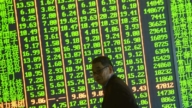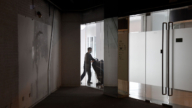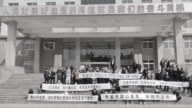【新唐人2013年03月01日讯】2月27号,美国《华尔街日报》发表题为《私人债务猛增为中国埋下炸弹》的文章。文章指出,从2008年以来,中国公共和私人债务超过GDP的2倍,这对任何一个发展中国家都是前所未有的水准,是导致经济崩溃的定时炸弹。
文章指出,中国经济一直靠大力投资发展,特别是2008年全球金融危机爆发后,为维持经济增长,惊慌失措的中共官员们推出了4万亿人民币的刺激方案,每年新增贷款量已增加了三倍多﹔仅过去12个月新增贷款就达2.75万亿美元,但其中约有一半来自“影子银行系统”。投资占中国GDP的比例已从43%升至48%,这对于任何一个大国来说都是空前的记录。
《华尔街日报》这篇文章的作者,是“摩根士丹利投资管理公司”新兴市场部的负责人沙姆(Sharm)。他认为,目前中国公共和私人债务总额超过GDP的2倍,这对任何一个发展中国家都是前所未有的水准。以衡量私人债务增速的最重要指标来看,中国现在已经处于十分危险的地带。
沙姆还指出,无论是从国际清算银行给出的指标,还是国际货币基金组织给出的指标,中国都将面临金融危机。
美国“南卡罗来纳大学”教授谢田认为,大量从影子银行贷款是威胁中国社会的一颗炸弹。谢田表示,由于中国金融系统的不完善,中小企业或私人企业无法从国有银行得到贷款,为维持企业运转他们只好从利率极高的影子银行贷款。当企业无法支付这么高的借贷利率时,企业就会破产或者老板“跑路”,那么这些贷款就变成了坏账。
谢田:“坏账出现,首先这些地下银行、地下钱庄、影子银行他们会大量的破产和倒闭,这就会涉及到很多很多牵扯其中的人,而这些人又可能大量是中小企业主、私人企业者、民营企业、民间企业。他们大批破产或垮台的话,也会带来很大的失业、就业的问题。”
谢田指出,如果中国失业率继续上升或经济继续衰退,或者中央政府收紧银根,都可能引爆这个炸弹,甚至国有银行都有可能被拖垮。
沙姆还写道,即使中国能躲过金融危机,也不太可能躲过日益受到债务拖累的国民经济增长放缓。实际上,中国约有三分之一的银行贷款流向投机行为的房地产,出口和工业生产已经放缓。他指出,中国如果要实现经济再平衡,必须削减投资,降低债务增速。
大陆不少学者也警告中国将出现经济危机。国务院发展研究中心资源与环境政策研究所副所长李佐军,在一场内部报告会上的题目就是《2013年中国将爆发经济危机》。他认为,引发这场危机爆发的可能性有两个,一个是房地产泡沫破灭,另一个是地方债务危机。
但中共政府内部却仍认为,中国金融系统或经济增长几乎不存在什么风险,因为中国外债非常少,还有超过3万亿美元的外汇储备和庞大的国内储蓄,可以承担注销坏账的风险。
《新唐人》特约经济评论员马杰森也认为,中国银行都是中共政府所有,即使出现大量坏账,他们会转嫁危机,让全体老百姓来承担。
《新唐人》特约经济评论员马杰森: “去年经济发展放缓后,中共的解决办法也就是靠银行拚命贷款,也就是给地方政府和大中型企业创造债务,那么这个债务贷款最终就变成了印钞。 在过去30多年里头,或者中共执政60多年里,几次都发生这样的事,就是让银行多印钞票,把债务变成通胀,最终是老百姓靠通胀来解决中共的债务的问题。”
马杰森指出,像上个世纪59年到62年的所谓“三年自然灾害”,中国饿死3000多万人。从国外看就是经济崩溃,但中共既不承认经济崩溃,也不承认执政有问题。所以,不能用国际规律来看中国问题。
采访/朱智善 编辑/宋风 后制/萧宇
U.S. Media on China’s Debt Bomb
On February 27, The Wall Street Journal (WSJ) published
the article, “China Has Its Own Debt Bomb”.
The article pointed out that since 2008, China’s public
and private debts are more than twice its GDP.
This is an unprecedented level in any developing country
and a time bomb for the economy collapse.
The article pointed out that China’s economy
has been relying on heavy development of investments.
Especially after the 2008 global financial crisis,
in order to maintain economic growth,
the panicked Chinese Communist Party’ (CCP) officials
introduced a stimulus package of 4 trillion Yuan.
The annual amount of new loans increased over threefold;
for the past 12 months, the new loans reached $2.75 trillion,
but about half of them came from the ‘shadow bank system.’
The investments share increased from 43% to 48%,
which is an unprecedented record for any country.
The author of the article, Ruchir Sharma, is responsible
for the Emerging Markets department at the Morgan Stanley Investment Management Company.
He believes that now China’s public and private debt
is more than 2 times its GDP, which is an unprecedented level in any developing country.
According to the most important indicators to measure
private debt growth, China is now in a very dangerous zone.
Sharma also pointed out that based on indicators from
the Bank of International Settlements and the IMF, China will face financial crisis.
Professor Xie Tian from the U.S. University of the South
Carolina believes that the large number of loans from shadow banking is a ticking bomb for the Chinese society.
Xie reminded that in China small, medium, or private
enterprises cannot get loans from the state-owned banks.
In order to maintain their business they have to apply
for shadow banking loans with very high interest rates.
When the enterprises cannot pay such high interest rates,
the enterprise will go bankrupt, or the boss will ‘runaway,’ then these loans become bad debts.
Xie Tian: “When the bad debts become too much, these
underground shadow banks will go bankrupt and collapse.
As many people are involved, most of them are probably
owners of medium, small, and private enterprises.
If a large number of them go bankrupt,
there will be a big issue with the unemployment.”
Xie pointed out, if China’s unemployment rate keeps rising,
or the economic recession continues, or the central government tightens the monetary policy,
all these are likely to detonate the bomb,
and even the state-owned banks will collapse.
Sharma also wrote, even if China was able to escape
the financial crisis, it is unlikely to avoid national economic slowdown which comes with the debts.
In fact, about one third of China’s bank loans are involved
in the speculative real estate, whereas export and industrial production have slowed down.
He pointed out, if China wants to balance the economy again,
it has to decrease the investments and growth rate of debts.
Many mainland China scholars have warned
about China’s economic crisis.
Li Zuojun, deputy of State Research Center at the Resource
and Environmental Policy Institute, wrote the article, “The outbreak of economic crisis in China 2013.”
Shown at an internal meeting, the paper talks of two factors,
which can lead to crisis outbreak: the real estate bubble burst, and the local debt crisis.
However, the CCP’s regime still believes,
the financial system and economic growth are not at risk,
because China has so little foreign debts, as well as
over 3 trillion U.S. dollars in foreign exchange reserves,
plus huge domestic savings,
which can absorb the risk of bad debts.
NTD’ special economic commentator, Jason Ma also believes
that if many bad debts appear, they will be passed on to the ordinary people, as the banks are owned by CCP’s regime.
Jason Ma:“After the economic slowdown last year,
the CCP’s solution is to rely on banks to give loans.
This is to create huge debts for the local governments,
and medium and big sized enterprises.
Thus this debt loans eventually became
just printed money.
In the last 60 years, since CCP is in power, this happened
several times, they let the banks print more money,
turn the debts into inflation, eventually relying on imposing
inflation on people to solve CCP’s debt.”
Ma gave as an example China’s “Three Years Great Famine”,
(1959 to 1962,) when over 30 million people died of hunger, from “natural disasters”, as the CCP claims.
Yet, according to independent sources this was a collapse
of the economy, but the CCP never admitted this, nor that it was a ruling problem too.
Thus, one cannot use the international law
to assess and measure China’s problems.

























